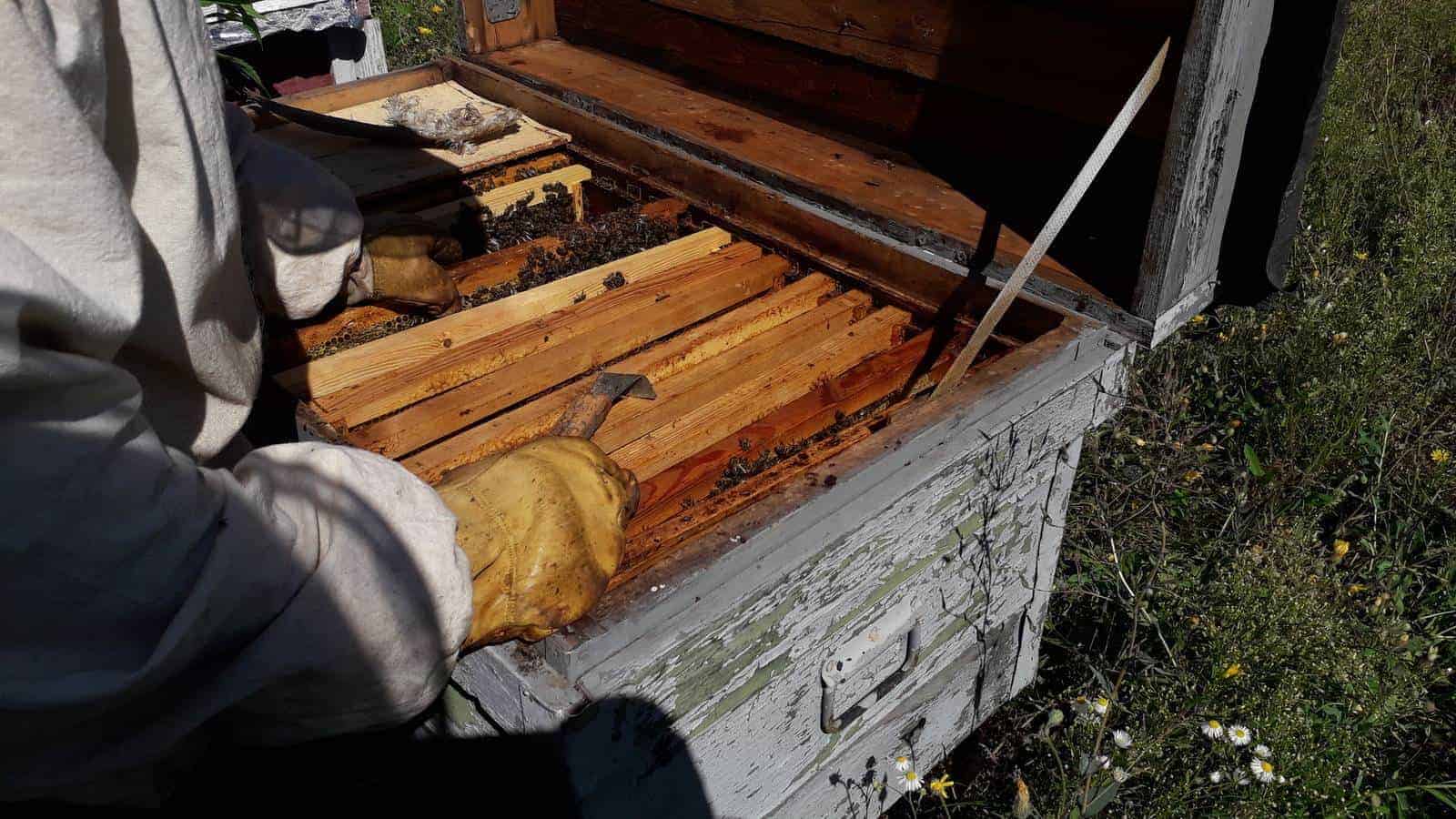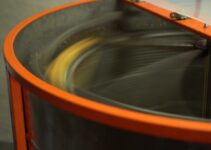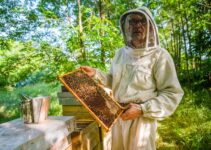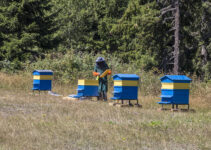A lot of beekeepers enter the field of beekeeping primarily because they want to harvest honey, which can be sold at a good price or can be kept or stored in your home for an extended period of time. That said, you should know that honey is also a food source for the bees especially during winter. So, if honey is food for the bees, is harvesting honey actually harmful to them?
Harvesting honey is not harmful to the bees. The reason why harvesting honey from the bees is not harmful to them because bees produce honey round the clock as long as they have a good supply of nectar and pollen. As such, the honey you are harvesting is actually the surplus that the bees don’t need.
While honey is indeed a food source for bees and is the type of food they tend to store so that they can have enough food during the winter, harvesting honey does not harm them as long as you know your limits and that you are harvesting honey the right way. That said, let’s try to learn more about why you don’t end up harming bees when you know how to properly harvest honey.
Why we shouldn’t take honey from bees?
One of the most popular reasons why beekeepers actually enter the field of beekeeping is so that they can take advantage of the honey that they can harvest from their beehives. With how much more people are beginning to see the value of using honey over any other type of sweetener, you can actually make a quick buck out of selling honey.
Moreover, you can even keep your honey with you at home and only harvest it from your bees if you need it. So, think of it as having an unlimited supply of honey that you can harvest and consume whenever you need it. This should be one of the instances why there are some people who enter beekeeping as it allows them to have plenty of honey they can use whenever they want.
But while it has been common for humans to harvest honey from beehives for thousands of years already, there are actually some people who believe that collecting honey from the beehives can spell trouble for the bees themselves. They are basically saying that it might be bad for you to harvest honey from the beehives because of how it could lead to adverse effects on a section of the bees or even the entire colony.
So, why are they saying that? Let’s go over some of the reasons that have led people to think that harvesting honey from beehives can actually be harmful to the bees and have a negative impact on the colonies.
Bees eat honey
The honey you harvest from the beehives is technically not a gift from the bees to you. These bees produce honey for a reason, and that reason is not to please you or anyone else. Of course, they produce honey because the bees actually eat and consume honey as one of their food sources.
Yes, even though bees produce honey, they also do so because they need honey as one of their food sources. Bees collect nectar and pollen from plants and then make use of them to produce honey, which they keep as a food source that will not spoil. In that sense, they can keep the honey in their hives for an indefinite period of time so that they can easily eat it whenever they run out of food.
This practice is much more common during the winter as bees tend to collect nectar and pollen from flowers during the warmer season so that they can produce and store honey in time for the winter. That’s because winters are too cold for them to be able to come out of their hives. And even if they could come out during the winter, there are no available plants for them to forage food from.
So, what they do during the winter is that the bees actually eat the honey they were able to store up during the earlier seasons so that they can have enough food that would last until spring arrives. In short, honey becomes their emergency food during the winter or whenever there are no available flowers for them to forage nectar and pollen from.
If you harvested honey from the bees to the point that you are not leaving behind enough honey for them, what happens is that they won’t be able to have enough food to last throughout the entire winter. You are essentially going to deprive them of the only food source they have whenever they can’t even go out to look for food. So, without a good supply of food that could last throughout winter, your bees might end up dying before spring comes. This is why there are some people who say that it is actually bad to harvest honey from your hives.
Bees use honey
On top of the fact that honey is supposed to be a food source for the bees, it is also one of the raw materials that the bees use to produce one of the most important and most popular substances in the world. And yes, we are talking about beeswax.
Bees are able to make beeswax by eating honey, which will then be processed further by special glands that turn the honey into beeswax. After secreting beeswax, another bee will chew it to combine it with the enzymes in its saliva so that the beeswax will become softer and more moldable. It is said that bees need to eat 8 to 10 pounds of honey just so they can produce a single pound of beeswax.
Beeswax is not only a substance that people use to make candles, soaps, lotions, and other similar products. Instead, beeswax plays a very important role in the survival of the entire bee colony because this substance is one of the foundational materials they use to construct their hives and to make the different honeycomb that they use as containers for their honey or as cells where they keep their larvae and eggs.
What happens is that the bees will use beeswax to draw comb (the process of making and forming honeycomb) so that they can use the comb for a lot of different purposes such as for honey storage and for rearing the larvae. Moreover, by drawing some comb, the bees can also help insulate the entire hive, especially in preparation for the freezing temperatures of winter.
In short, honey becomes important here because it is the foundational substance used to create beeswax, which has its own importance to the survival of the entire beehive. Without honey, the bees won’t be able to have the right kind of raw material to use to create beeswax. So, by depriving your bees of the honey that they need, they won’t be able to have enough supply for the beeswax, which is important for drawing out comb.
Should you leave honey out for bees?
Now that you know that honey is an important food source for bees because of how they make use of it as a way for them to keep themselves well-fed throughout the winter while also having enough raw materials that they could use to produce beeswax, you might be thinking of actually leaving honey out in the open for the bees to eat. Is that a good idea?
Unfortunately, it isn’t a good idea for you to leave honey out for bees. It does sound like you are doing your bees a favor by leaving a jar of honey out in the open so that the bees can eat or use the honey. But the problem here is that this could cause serious problems and issues regarding the bees’ overall health.
The reason why honey left in the open can cause problems for bees is that this can lead to the spreading of viruses, bacteria, and harmful diseases from one colony to another when you collect honey from one of the hives only to leave it out in the open for all of the other bees to feed on. Even though you might have cleaned your honey when you filtered it, it can still harbor different micro-organisms such as spores and bacteria. And you wouldn’t want to end up spreading diseases from one colony to another.
So, if you want to feed your bees with honey, the best way to do so is to actually leave the honey inside the hives so that they can make use of the honey as a food source whenever they want. This is the safest way to make sure that diseases do not spread from one colony to another as your bees will only be eating the honey that they themselves made.
But if you do have a surplus of honey that you harvested from the hives, make sure you label the honey so that you would know from which hive they came from. You can easily put the honey back in the comb and then reintroduce the comb to the beehives so that the bees would be able to eat or use the honey whenever they want to. As long as you are reintroducing honey to the beehive from which it was harvested, it is perfectly alright for you to do so.
How can I get honey without harming bees?
So, now that you know that harvesting honey from bees can be harmful to them, here are some factors that you should look at first before you attempt to harvest honey from your hives:
Newer hives need time to settle
Similar to how you shouldn’t expect a new farm to be able to immediately grow and sell a lot of crops, the same should be expected of newer hives. Colonies that have just established themselves need time to develop and settle down first, as the bees are still trying to settle in and adjust to the environment.
As such, this is why you should focus more on allowing your beehives to grow during the start instead of actually forcing them to produce more honey. The general rule is that new beekeepers should focus more on inducing their bees to produce and draw comb because the bees would need this to fully establish their hive.
This is also why new beekeepers should never expect to be able to harvest honey during their first year because the focus here is to allow the hives to establish. In most cases, there are even beekeepers who don’t harvest until their third year because they want to give their bees as much time as needed to completely settle down.
And if you do indeed plan on harvesting honey during your second year, always wait until the winter is over so that you can harvest during the next spring. You are now harvesting the leftover honey that the bees were unable to consume during the winter when they needed the honey as their only source of food. So, if you harvest honey as early as spring, you will be giving enough time for your bees to collect more nectar in time for the next winter.
Consider the flowers and the availability of nectar
In case you have forgotten, bees forage nearby plants or flowers for nectar and pollen so that they can use these to produce honey or as their primary food source. The more flowers and nectar there are, the better the honey production will be. On the flip side, if your bees don’t have enough flowers to collect nectar from, honey production will be on the low side and your bees won’t have enough food for themselves.
So, if your region has recently experienced a problem where the flowers weren’t able to bloom properly or when the availability of nectar is at a minimum level, your bees weren’t able to collect enough nectar and pollen for themselves. As such, collecting honey from a bee colony that wasn’t able to forage plenty of nectar can be quite cruel because you are basically taking away their food source. The colony will likely perish as a result of this.
Length of winters
Again, we said that bees are likely to store and keep honey as a backup food source during the times when they cannot go out to forage for nectar and pollen. Of course, this includes the winter season because there are no available plants to get nectar from and because the season is too cold for the bees to come out from their hives.
So, look at how long your winters are if you want to know whether or not you should be taking honey from your bees. If you live in a northern region where the winters are quite long and cold, it might be best to minimize harvesting honey from your bees because they would need the honey for their survival. But if you do live in a region with a warmer climate, you may be able to collect more honey because the winters are likely shorter.
Hive population
You also have to look at your hive population when you are deciding whether or not to harvest honey from your hives. Larger hives require a larger supply of honey so that they can have enough food to last during the winter. Meanwhile, smaller hives wouldn’t need as much honey as larger hives.
However, there is also a catch here. Leaving more than enough honey in the hive can also lead to problems, which we will be talking about later. That’s why you have to make sure that you balance out harvesting your honey versus not harvesting your honey. Or, better yet, just harvest the right amount of honey while leaving enough for the survival of your bee colony.
What happens if you don’t harvest honey?
While we did say that there can be times when harvesting honey from your hives can end up harming your bees, there are also times when not harvesting the honey can also lead to results that are undesirable. Let’s look at why this is so.
As we said, honey is one of the food sources that bees tend to keep and store in their hives in case they needed to eat it. However, bees are simply foraging and honey-making machines that don’t know when to stop. As long as they have enough nectar to forage, they will keep on foraging and producing honey.
Because honey is a food source to these bees, there might be times when the colony would end up growing rapidly as a result of the seemingly unlimited supply of food. And this can lead to problems on your part.
The first problem here is regarding the quality of your hive. When there are too many bees, what happens here is that the hive will become too crowded to the point that there won’t be enough room for newer bees. What happens is that the older bees won’t get replaced by newer bees that can work much more efficiently. This will lead to a hive population that is mostly composed of older and inefficient honey bees rather than younger ones that are much more efficient at working and foraging.
Our second problem here is when the hives get too crowded, swarming can happen. This will happen when the queen bee realizes that the hive is too small for it to lay more eggs and will begin to form a swarm while taking about two-thirds of the hive population with it to find a new hive. While the remaining bees are left to nominate and raise a new queen, you wouldn’t want the majority of your bees leaving as a result of overpopulation.
As such, making sure that you regularly harvest honey is a good way of regulating the honey bee population in your hives as this will prevent overcrowding. This is why it is also equally important for you to make sure that you harvest just enough honey that won’t deprive your bees but, at the same time, won’t end up leaving them with more than enough supply of it.
How to make sure that bees have enough honey?
So, now that we have established that it is equally important for you to harvest honey from your hives just as how it is important for you to leave behind the right amount of honey, how would you even know how much honey you should leave behind? How would you know that your bees have enough honey to eat as food?
Well, the first thing you should know is that this depends on a lot of different factors such as the climate in your area as well as the size of the population in each hive. You may end up following the general rules of how much honey to leave only to find out that you left out too little or too much for the entire hive.
In that case, you also need to know that there is no exact way for you to actually know how much honey to leave behind because there are plenty of different variables you have to consider when you are deciding how much to harvest and how much your bees should keep. That’s why there are generally accepted rules that most beekeepers tend to follow. Of course, it also boils down to experience as it might end up becoming second nature to you to know how much honey to leave behind in the hive.
So, the general rule is that beekeepers that are in regions that have warmer and temperate climates should leave behind about 40 pounds of honey in the hive over the winter. Meanwhile, for those who live in the northern regions that experience colder and longer winters, it is important to leave behind at least 60 pounds of honey in the hive.
You should also know that these numbers are based on an average-sized hive that has about 10 frames of honey supers. The numbers should fluctuate depending on how big or small your hives are. But the point here is that the point of reference should be a 10-frame hive.
For example, if you live in a place with a warmer climate and shorter winters, a hive with 12 frames should have about 50 pounds of honey. Another example is when you live in a colder region and you have a beehive with 8 frames. In such a case, you might want to leave behind 50 to 60 pounds of honey.
Again, the point here is to make use of the general rules as a point of reference for you so that you can adjust how much honey you should leave behind depending on the size of your hives and on the climate that your region experiences.
How many times a year do you harvest honey?
The number of times you harvest honey will also matter when it comes to making sure that you are not harming your bees in the process and in making sure that you are harvesting honey in a manner that is sustainable and healthy for you and your bees.
That said, most beekeepers tend to harvest honey only twice a year. They do so during the start of spring when there is enough honey left behind in the beehives over the winter. This should be a harvest that wouldn’t yield plenty of honey because you are only harvesting leftovers. Also, harvesting during the early part of spring will not hurt your bees because this is when plenty of flowers are in bloom and when the flow of nectar is pretty good.
Meanwhile, the second harvest should be during fall before the winter sets in. The purpose of this harvest is to harvest the honey that your bees produced from spring to fall, while leaving behind enough honey for them to eat during winter. This harvest should be heavier than your early-spring harvest considering that you allowed your bees to forage nectar and produce honey for more than two seasons.
Do bees get mad when you take their honey?
Finally, when you are harvesting honey from your bees, do the bees actually get mad? After all, you are taking away their food. This should put them on the defensive because you are depriving them of what is supposed to be theirs.
The truth is that yes, bees can get made when you take their honey. This is a natural reaction for them because they are naturally wired to try to protect their hive and their honey from predators who want to take away their food. One case in point is when bears try to take away honey from wild beehives.
That said, the reason why protective gear is important cannot be overstated when it comes to harvesting honey. Beekeepers are not only in full protective gear during harvest time but also come armed with smokers that burn safe and organic materials. Using the smoker lightly will be more than enough to keep the bees out of your way while you are collecting the honey supers from the hives.
Of course, trust in your beekeeping suit during the entire time while following the basics of how to behave around a beehive if you don’t want the bees swarming around you to sting you. This will minimize the chances of putting the bees on the defensive while you are taking away their honey. The less defensive bees are, the less likely they will sting you.
Sources:
https://beekeepclub.com/is-harvesting-honey-bad-for-bees/
https://thebeet.com/bee-keepers-love-bees-a-beekeeper-sets-the-record-straight-about-honey/




